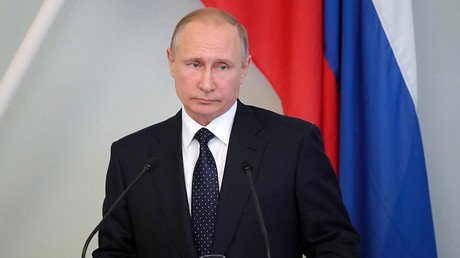Senate sends new Russia sanctions bill to Trump’s desk
The US Senate has approved further sanctions against Russia, Iran and North Korea, and now the bipartisan bill goes to President Donald Trump’s desk, where it may be vetoed or signed into law. The vote was 98 to 2.
The sanctions target Russian gas and pipeline developments by codifying six of former President Barack Obama’s executive orders implementing sanctions on Russia.
Senator Ben Cardin (D-Maryland), ranking member of the foreign relations committee, opened floor discussion Thursday evening.
The committee’s chairman, Senator Bob Corker (R-Tennessee), then yielded to Senator John McCain (R), who lauded the bipartisan process that supported the bill.
“We will not tolerate attacks on our democracy!” McCain, who chairs the armed services committee, insisted from the Senate floor. “That's what this bill is all about.”
All three countries were accused of violating “the international order” by Senator Bob Menendez (D-New Jersey), a former chairman of the foreign relations committee.
Opposition to the bill was bipartisan as well, but scarce, with only Senators Rand Paul (R-Kentucky) and Bernie Sanders (I-Vermont) voting against.
I am strongly supportive of sanctions on Russia and North Korea. However, I worry very much about President Trump’s approach to Iran.
— Bernie Sanders (@SenSanders) July 27, 2017
Leadership in the House and Senate agreed on the details of the sanctions bill late Wednesday, following the near unanimous vote in the House on Tuesday, 419 to 3. Senate passage sends the sanctions bill directly to Trump's desk, and lawmakers expressed mixed expectations on whether the president would sign it into law.
The new sanctions are a clear attempt by Congress to tie the hands of President Trump, who publicly said he wanted to improve relations with Russia, but as a foreign policy measure they are short-sighted and ineffective, retired US Air Force Lieutenant Colonel Karen Kwiatkowski told RT.
“It is intended to damage that relationship [with Russia]. I think it’s important to see that this is a Congressional act intended to damage Mr. Trump and his ability to conduct foreign policy,” Kwiatkowski said.
“They’re certainly attempting to limit [Trump’s] powers, and I think anybody who has watched American politics for the past six or seven months understands the panic that is present in our Congress amongst the opposition party and certain members of his own party. They’re very frightened at his ability and desire to execute power, to use the power of that office,” Kwiatkowski said.
“Clearly, the Congress, the House and the Senate have overstepped their abilities to understand and influence foreign policy. They don’t understand the impact of sanctions by extending these sanctions to other, allied companies… That is the height of arrogance and, mostly, ignorance,” Kwiatkowski argued, saying that the voting revealed that only a handful of “independent thinkers” are present in the Congress.
Kwiatkowski believes Trump himself is against the new measures as he is aware that sanctions are “largely ineffective” and “not a smart way to run foreign policy.”
She added: “Historically, they have not worked. Historically, they have hurt the very people they’re intended to help.”














